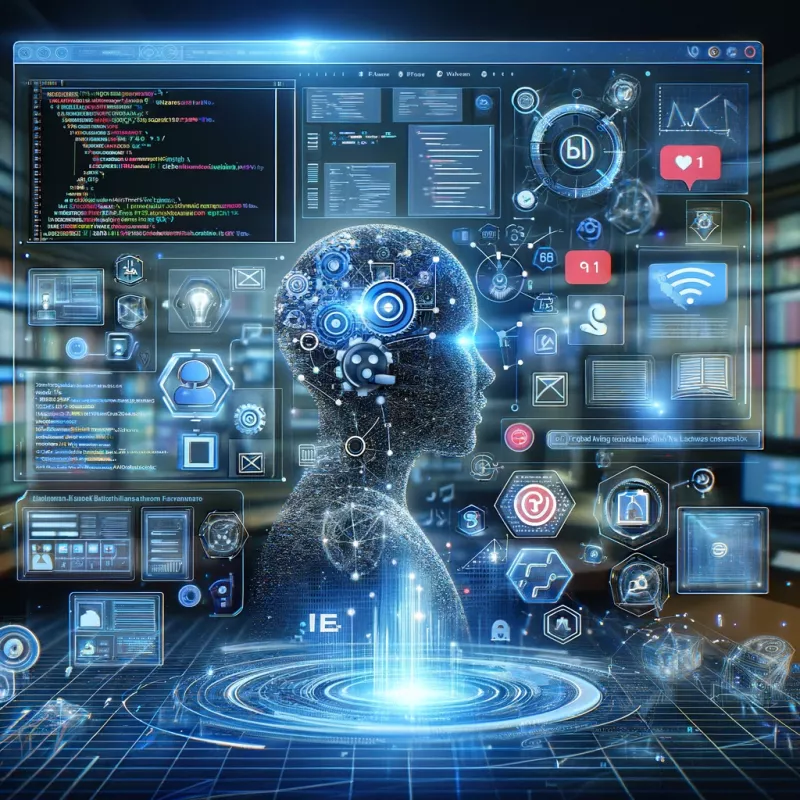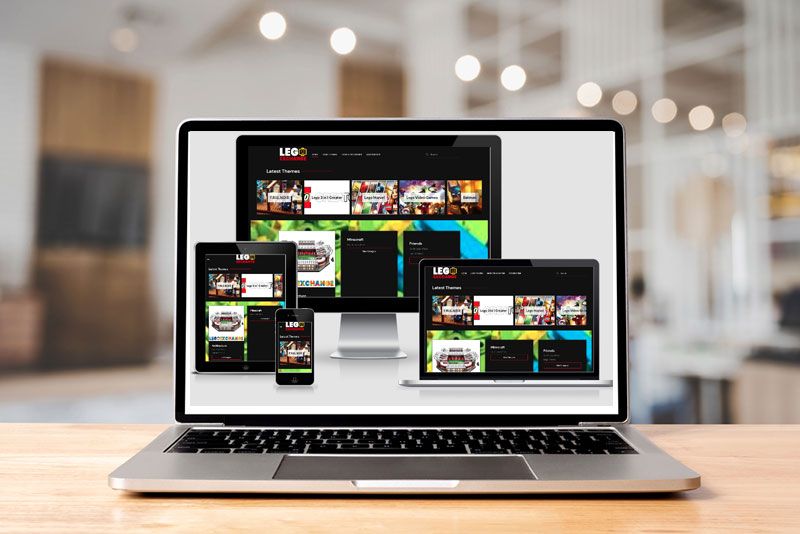WordPress SEO, WordPress Website Design
The Impact of AI on Website Design and Development: Revolutionising User Experience and SEO

How Is AI Personalising User Experiences on Websites?
AI-driven personalisation has become a cornerstone in enhancing user experience on websites. By leveraging machine learning in web design, developers can create systems that analyze user behavior analysis to deliver tailored content. This not only improves engagement but also ensures that users find what they need faster and with less effort. Netflix and Amazon are prime examples, where recommendations are made based on past interactions, significantly boosting user satisfaction and retention.
Moreover, AI for dynamic content delivery facilitates a more engaging interaction with users. Websites can adapt in real-time, presenting information and options based on the user’s current context and past behavior, leading to a highly AI-enhanced user experience that feels intuitive and responsive.
What Role Does AI Play in SEO Optimisation for Modern Websites?
AI-powered SEO tools have transformed how websites approach search engine optimization. These tools utilize advanced algorithms to sift through data, identifying patterns and insights that can lead to search engine ranking improvements. From keyword analysis to backlink opportunities, AI provides a competitive edge in crafting strategies that resonate with both users and search algorithms.
Content optimisation AI further streamlines the creation of SEO-friendly content. By analyzing top-performing content across the web, AI tools can suggest optimizations, from keyword density to semantic richness, ensuring that content not only appeals to readers but also ranks well on search engines.
Can AI Replace Human Creativity in Website Design and Development?
While automated website design tools powered by AI have made significant strides in creating visually appealing layouts and elements, the creative intuition and emotional intelligence of human designers remain irreplaceable. AI can offer suggestions and generate prototypes, but the nuanced understanding of brand identity and user emotion still relies heavily on human input.
However, AI-driven website prototyping has become an invaluable tool in the design process, offering rapid iteration and testing capabilities that can greatly enhance the creative workflow. This synergy between human creativity and AI efficiency is shaping a new era of web design.
How Are AI Technologies Enhancing Website Hosting and Maintenance?
AI website hosting solutions are revolutionizing the hosting landscape by providing smarter, more efficient services. From predictive maintenance for websites to ensure uptime, to real-time threat detection for enhanced security, AI is at the forefront of making web hosting more reliable and secure.
Furthermore, AI in website backups and recovery introduces automated, error-free processes that ensure data integrity and quick recovery from any incidents, minimizing downtime and protecting against data loss.
What Impact Does AI Have on Social Media Marketing Strategies for Websites?
AI in social media marketing has opened new avenues for engaging with audiences. By analyzing user engagement analytics, AI tools can optimize content delivery, ensuring that messages reach their audience at the ideal time and in the most engaging format. This targeted approach leads to better engagement rates and more effective marketing campaigns.
Additionally, AI-generated content strategies leverage data to produce content that resonates with users, enhancing brand presence across social media platforms and driving traffic back to the website.
How Will AI Continue to Transform the Future of Website Design and SEO?
The future of web development and SEO is intrinsically linked to the advancements in AI technology. From generative AI in design to predictive analytics in web development, AI is set to offer unprecedented possibilities for creating more intuitive, engaging, and high-performing websites.
Website traffic growth forecasting and adaptive user interfaces are just the tip of the iceberg. As AI tools become more sophisticated, they will enable designers and developers to push the boundaries of what’s possible, crafting online experiences that are more personalized, accessible, and effective than ever before.
What Are the Ethical Considerations and Challenges of Using AI in Web Design and Development?
Ethical AI in web development is a growing concern, with issues around data privacy, consent, and bias taking center stage. As AI technologies become more embedded in web design and development processes, it’s crucial for professionals to adhere to ethical standards, ensuring that AI is used responsibly and transparently.
Balancing innovation with ethical considerations requires ongoing dialogue, clear regulations, and a commitment to developing AI in a manner that respects user rights and promotes inclusivity.
Advantages and Disadvantages of AI in Website Design and Development
| Advantages | Disadvantages |
|---|---|
| Enhanced user personalization | Potential for data privacy issues |
| Improved SEO through data-driven insights | Over-reliance on technology |
| Efficiency in design and development processes | Risk of diminishing creative roles |
| Proactive website maintenance and security | Ethical concerns regarding AI decision-making |
| Dynamic content delivery and marketing | Challenges in integrating AI with existing tools |
How Does AI Contribute to Adaptive User Interfaces in Website Design?
Adaptive user interfaces, powered by AI, are transforming the way websites interact with users. By dynamically adjusting layouts, content, and functionalities based on user behavior and preferences, these interfaces offer a more personalized and efficient browsing experience.
This level of real-time website customisation not only enhances user satisfaction but also significantly improves website performance metrics, such as time on site and conversion rates, by presenting users with exactly what they need, when they need it.
What is the Impact of AI on Accessibility in Web Design?
AI in website accessibility is making the web more inclusive. AI-powered tools can automatically adjust websites to meet various accessibility standards, ensuring that content is available to everyone, regardless of their abilities. This includes features like automatic alt text generation, voice navigation, and content simplification.
Improving accessibility through AI not only broadens the audience reach but also emphasizes the ethical responsibility of web developers to create experiences that are universally accessible.
How is AI Transforming Content Creation for SEO?
In the realm of SEO, AI-driven content creation tools are enabling more effective and efficient production of content that is both user and search engine friendly. These tools analyze vast amounts of data to suggest topics, keywords, and formats that are likely to perform well, significantly improving the SEO strategy.
Moreover, AI-powered SEO tools assist in optimizing existing content, ensuring that it remains relevant and continues to drive traffic over time, a critical aspect of maintaining and improving search engine rankings.
AI and Link Building: Future Prospects and Current Practices
AI tools for link building are streamlining the process of identifying and securing valuable backlinks. By analyzing the web to find relevant, high-authority sites, AI makes link-building efforts more targeted and effective.
The future of link building with AI looks promising, with the potential for even more sophisticated analysis of link value and the automation of outreach and negotiation processes, making link building faster and more efficient.
The Future of AI in Website Prototyping and Wireframing
AI-driven website prototyping represents a significant leap forward in the design process. By automatically generating design options based on best practices and user data, AI tools allow for rapid iteration and testing, reducing the time and cost associated with traditional prototyping methods.
This not only speeds up the design process but also allows for a greater focus on user experience and functionality, leading to better-designed websites that meet users’ needs more effectively.
AI-Driven Analytics: Shaping the Future of Web Development Decisions
Predictive analytics in web development are enabling developers to make more informed decisions about design, functionality, and optimization. By analyzing user data and behavior, AI can predict trends and preferences, guiding the development process towards solutions that will meet future user needs.
This forward-looking approach ensures that websites remain relevant and engaging, providing a competitive edge in an ever-evolving digital landscape.
Predictive Maintenance: AI’s Role in Preventing Website Downtime
Predictive maintenance for websites, facilitated by AI, is ensuring higher levels of reliability and performance. By analyzing data from various sources, AI can predict potential issues before they occur, allowing for proactive maintenance and updates.
This not only reduces downtime but also improves the overall user experience by ensuring that websites are always available and performing optimally, a critical factor in retaining user engagement and loyalty.
AI in Enhancing Website Security Postures
With cyber threats becoming more sophisticated, AI website security solutions are becoming essential for protecting websites. AI’s ability to learn and adapt to new threats in real-time means that it can provide protection against a broad range of attacks, from DDoS to phishing and malware.
This proactive security approach is crucial for maintaining user trust and ensuring that personal and financial information is protected, an increasingly important consideration in today’s digital world.
AI in Real-Time Website Performance Optimization
Website performance optimization AI is revolutionizing how websites are maintained for optimal speed and reliability. By continuously analyzing performance data, AI can make real-time adjustments to hosting resources, content delivery, and coding practices, ensuring that websites load quickly and run smoothly for every user.
This level of optimization not only enhances the user experience but also contributes to better SEO, as site speed and reliability are key factors in search engine ranking algorithms.
The Role of AI in Website Traffic Analysis and Growth Forecasting
Website traffic growth forecasting through AI offers unprecedented insights into how websites can evolve to meet future demand. By analyzing trends and patterns in user behavior, AI can predict changes in traffic volume and user needs, allowing developers and marketers to prepare and adapt their strategies accordingly.
This predictive capability ensures that websites can scale effectively and continue to provide excellent user experiences, even as audiences grow and change.
Navigating the Ethical Landscape of AI in Website Design
The ethical use of AI in website design raises important questions about privacy, consent, and bias. Ethical AI in web development requires a commitment to transparency, ensuring that users understand how their data is being used and have control over their personal information.
Addressing these ethical challenges is essential for building trust and ensuring that the benefits of AI are realized in a way that respects user rights and promotes fairness.
Overcoming Operational Challenges in Integrating AI into Web Development Workflows
Integrating AI into existing web development workflows presents several challenges, from technical integration issues to skills gaps. Overcoming these challenges requires a focus on education and training, as well as the development of tools and platforms that can seamlessly integrate AI functionalities into the web development process.
By addressing these operational challenges, developers can fully leverage the benefits of AI, enhancing their workflows and creating more effective, user-friendly websites.
Exploring the Potential of Generative AI in Website Design
Generative AI in design is opening up new possibilities for creativity and innovation in website design. By generating original design elements and layouts based on user data and design principles, generative AI can provide designers with a wealth of ideas and inspirations, pushing the boundaries of what’s possible in web design.
This use of AI not only enhances the design process but also ensures that websites are highly tailored to user needs and preferences, leading to more engaging and effective online experiences.
The Impact of AI on E-commerce Website Personalisation Strategies
In the e-commerce sector, AI for e-commerce personalization is transforming how businesses interact with their customers. By analyzing user behavior and preferences, AI can tailor the shopping experience for each individual, from personalized product recommendations to customized marketing messages.
This level of personalization not only improves the user experience but also drives sales and customer loyalty, making it a key component of successful e-commerce strategies.
FAQ’s
What are the main benefits of using AI in website design?
The main benefits include enhanced personalization, improved SEO, greater efficiency in design and development, proactive maintenance, and more effective security measures.
How does AI improve website security?
AI improves website security by continuously monitoring for threats and anomalies, enabling real-time detection and prevention of cyber attacks.
Can AI fully replace human designers and developers?
While AI can automate many aspects of design and development, human creativity and insight remain essential for creating engaging and effective websites.
Site sources
For more information on website maintenance and AI in web development, visit WordPress Updates and Zerophoid.
Conclusion
The impact of AI on website design and development is profound, offering the potential to revolutionize user experience and SEO. From personalizing user interactions to optimizing content for search engines, AI is enabling more effective, efficient, and secure websites. However, realizing the full potential of AI requires addressing ethical considerations and operational challenges, ensuring that technology enhances rather than replaces human creativity and insight.
Key Takeaways
- AI is transforming website design and development, enhancing personalization, SEO, and security.
- Ethical and operational challenges must be addressed to fully leverage AI in web development.
- The future of web design and development is likely to see even greater integration of AI, offering new possibilities for creativity, efficiency, and user engagement.
By embracing AI and addressing its challenges, the web development industry can create more engaging, effective, and secure online experiences for users worldwide.
Latest Posts


